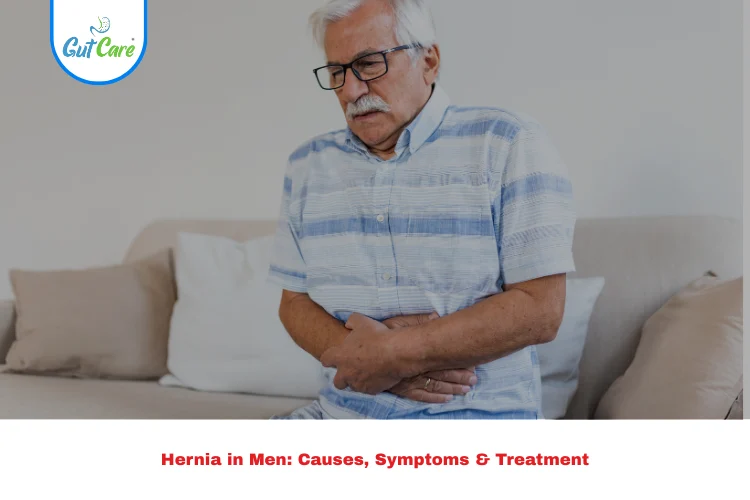Hernia is a typical health condition among men that can have an adverse effect on one’s quality of life if not promptly addressed. At Gutcare Clinics in the city of Bangalore, we see many men seeking help for hernia conditions so it can be treated early and specific conditions can be treated and managed in the appropriate manner. Awareness of the symptoms, causes, and risk factors of hernia in men is important for timely intervention, and to help prevent complications.
What is a Hernia in Men?
A hernia occurs when an internal organ or connective tissue protrudes through a weak area of muscle (or connective tissue). In men, hernias are typically found in the abdominal or groin areas and can include inguinal hernias and umbilical hernias.
Men are more likely than women to get a hernia because of anatomical differences, including the built-in weakness in the inguinal canal. Though men of all ages can develop a hernia, hernias in men are most common with men over 40.
Causes of Hernia in Men
Several factors contribute to the development of a hernia in men:
Muscle Weakness – Age, genetics, and previous surgeries can weaken abdominal muscles, making men susceptible to hernias.
Heavy Lifting – Straining during lifting or intense physical activity can trigger a hernia.
Chronic Cough or Constipation – Persistent pressure on the abdomen increases the risk of tissue protrusion.
Obesity – Excess body weight adds pressure on the abdominal wall.
Smoking – Smoking affects tissue strength and slows healing.
Identifying the cause is important for both prevention and treatment.
Recognizing Hernia in Male Symptoms
You should know that recognizing the hernia in male symptoms can increase the odds of men receiving medical attention sooner rather than later. Some of the common symptoms include:
- A bulge felt in the groin or abdomen that goes away when a person lies down
- Pain or discomfort, especially when bending, coughing, or lifting
- Pinching, a feeling of weakness, or heavy feeling in the abdomen
- Swelling or tenderness surrounding the area affected by the hernia
- In some extreme circumstances there could be nausea, vomiting or problems with bowel movement.
If any of these symptoms appear, consult a specialist like Dr. Yuvrajsingh Gehlot at Gutcare Clinics can ensure proper diagnosis and treatment.
Risk Factors for Hernia in Men
There are many risks factors which can affect one’s chance of developing a hernia:
• Age – Muscle strength declines with age, making someone more susceptible to developing a hernia.
• Family history – Hereditary factors play a major role in hernia predisposition.
• Physical activity – Work and activities that involve heavy lifting or standing for prolonged periods can be risk factors.
• Medical status – Conditions that cause chronic coughing, or constipation can increase abdominal pressure. Likewise, an enlarged prostate can lead to increased abdominal pressure.
• Lifestyle – Smoking, increased BMI and nutrition with high processed foods can also weaken abdominal muscles.
Being aware of these risk factors helps in early detection and prevention.
When to Consult a Specialist
While some hernias are painless and may seem minor, consulting a medical professional is crucial. Immediate attention is necessary if there is:
- Severe or sudden pain
- Redness, tenderness, or swelling at the hernia site
- Vomiting or nausea
- Signs of strangulation (where blood supply to the tissue is blocked)
Specialists like Dr. Yuvrajsingh Gehlot can provide accurate diagnosis, discuss treatment options, and determine whether surgery is required.
Treatment Options
Treatment depends on the type and severeness of a hernia:
Lifestyle Changes – Avoiding heavy lifting, losing weight (if there is a need), and taking on constipation issues can help keep a hernia from worsening.
Medications – Medications to manage the pain and treat any associated symptoms may be prescribed.
Surgery – In severe cases, a hernia repair surgery may be indicated including laparoscopic mild/moderate hernia invasion.
Consulting an experienced specialist ensures personalized care and reduces the risk of complications.
Prevention Tips
There are a couple of things that men can do to help minimize their risk for developing hernias:
- Using proper lifting techniques
- Maintaining a healthy weight and nutrition
- Quitting smoking
- Exercising to strengthen abdominal muscles
- Visiting a doctor early in the case of symptoms
- Preventive measures combined with early intervention can improve outcomes significantly.
Summary
Hernia in male is a prevalent yet manageable condition. Identifying hernia in male symptoms, acknowledging the causes, and identifying the risk factors is important for intervention and treatment. Hernia management, at Gutcare Clinics, Bangalore, it is important to have an expert explanation. What can be done in male hernia assessment varies from making lifestyle changes to specialist surgery interventions from an expert as Dr. Yuvrajsingh Gehlot. If you still have your symptoms, do not hesitate to seek professional help for your overall health.
Frequently Asked Questions (FAQs)
1. What are the early signs of a hernia in men?
Early signs include a visible bulge in the groin or abdomen, mild discomfort, or a heavy feeling in the affected area. Recognizing these symptoms early allows for timely consultation with a specialist.
2. Can a hernia in men heal on its own?
No, hernias do not heal naturally. Medical intervention, including surgery, is usually required to prevent complications such as strangulation or obstruction.
3. Who is the best specialist for hernia treatment in Bangalore?
Dr. Yuvrajsingh Gehlot at Gutcare Clinics is a trusted specialist in hernia treatment for men, offering both consultation and surgical options.
4. What lifestyle changes help prevent hernia in men?
Maintaining a healthy weight, avoiding heavy lifting, quitting smoking, and practicing abdominal exercises can reduce the risk of hernia.
5. What are the common hernia in male symptoms that require urgent care?
Severe pain, swelling, redness, vomiting, or difficulty passing stool are critical symptoms that require immediate medical attention.




